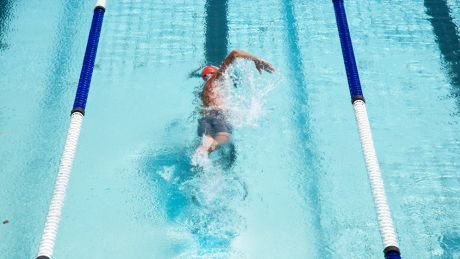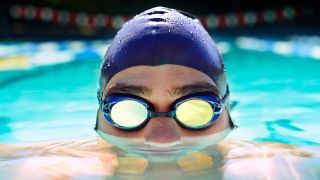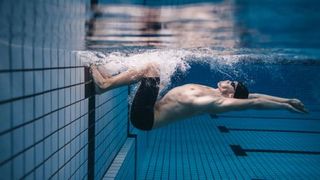The Benefits Of Swimming Will Convince You To Dig Out Your Swimming Costume
How swimming can help you lose weight, get fitter and relax

If you consider the main aims of most fitness regimes – to lose weight, improve fitness, build muscles and benefit your state of mind – there are few sports that tick all the boxes as emphatically as swimming. On top of all that, swimming provides a full-body workout with minimal risk of injury, which makes it an excellent choice for cross-training. But don’t just take our word for it: we spoke to former international triathlete and Speedo coach Annie Emmerson, psychological consultant Dr Chris Shambrook at Believe Perform who is also working with Speedo, and chiropractic care expert at ProBack Dr Nathanael Bogedain to get the experts’ take on the main benefits of swimming.
Another topical benefit we must mention is that indoor pools pose a comparatively minimal and manageable risk when it comes to catching and spreading COVID-19. Swim England’s head of facilities says the available evidence points to coronavirus quickly becoming inactive once it comes in contact with the chlorine in pools. Leisure centres are also able to use booking systems to control the number of households in changing rooms. With winter fast approaching, a COVID-secure indoor exercise option is a benefit of prime importance – we just hope this benefit ceases to be relevant as soon as possible.
1. It Will Improve Your Cardiovascular Fitness
An obvious place to start is that swimming will make you fitter, especially if you do it frequently and get your technique nailed down.
“It’s true to say that the better your technique is, the more that you’re going to get out of swimming in terms of fitness, but the benefits are massive whatever level you’re at,” says Emmerson.
2. It Builds Muscle All Over The Body
We’ve all gazed in slack-jawed admiration at the bodies of Olympic swimmers. While a few laps of the local lido every week is unlikely to result in equivalent changes to your torso, swimming will quickly make muscles all over your body bigger and stronger.
“Some people have body types where they pack muscle on quicker than others, but you have to swim a lot of miles to significantly change your shape and bulk up. But what you will find is that swimming strengthens muscles from top to bottom quite quickly. You work your core and legs as well as your upper body.”
3. Injuries Are Incredibly Rare
With the water supporting your bodyweight, swimming is a great way for anyone to work out without putting stress on your joints.
“It’s the only sport which is completely non weight-bearing so it is really hard to injure yourself in the pool. You can pick up tendonitis in the shoulder areas but that’s really rare, and the injury will be low-grade. I’ve never known any other injuries in the pool, really.”
4. It Can Help Ease And Prevent Back Pain
Obviously it’s no magic bullet, but if you’re looking to manage a flare-up of sciatica (pain in the legs originating from the lower back) or joint pain, a swim can do wonders.
“Swimming allows you to perform light resistance and cardiovascular training with very little impact on the spine,” says Bogedain. “The resistance aspect increases spine stability, which helps to manage back pain, and in addition to the usual benefits of cardio training, a good workout will enable your body to send more oxygen to sore back muscles, providing temporary relief.
“Thanks to the lightness your body experiences in water you’re more likely to twist into positions that will loosen up the joints and muscles which contribute to back pain.”
5. It Will Help You Lose Weight
Due to the weight-bearing properties of the pool, swimming serves as an excellent way for overweight people to work out without straining their body. It might not burn calories quickly as some other, more intense, workouts, but it will get the job done in terms of weight loss.
“If your goal is to lose weight then swimming is going to help because you’re raising your heart rate,” says Emmerson. “I don’t think it’s the sport that will burn the most calories, but when you know how to work out in the pool and your technique gets better, you can push yourself harder.”
See related
6. It’s Ideal For A Mental Break
The pool is the perfect place to cut yourself off from the rest of the world and relax.
“Even when you go out running you’re always aware of cars and it’s the same on the bike,” says Ememrson. “The pool is a really safe place to be. Not only because no-one’s going to run you over but in that you don’t have to worry about anything – you can shut off and mentally de-stress.”
In addition, the rhythm of swimming can help move you into a more mindful state.
“Being able to switch off judgemental thinking and simply be with our thoughts is a key element of mindfulness,” says Shambrook. “Much of mindfulness also promotes the power of being in the moment by tuning in to the calming power of controlled breathing. If you’re swimming for pleasure, it seems that these qualities can be present in almost every stroke, so as well as the cardiovascular benefits of swimming, it’s clear to see that you can be nourishing your mind and soul while immersed in the water.”
7. It Improves Your Flexibility
While swimming won’t stretch you as effectively as yoga or Pilates, the range of motion involved in swimming lengthens the muscles in a way that can make your joints more flexible and help recovery.
“In the pool you’ve got to be straight – you’re stretching your whole body,” says Emmerson. “I definitely think it has a therapeutic effect in terms of stretching the body.”
8. It Will Make You Better At Other Sports
If you’re a keen runner, cyclist or any other kind of athlete, it will do your performance the world of good to add swimming into your routine. As a low-impact exercise that builds fitness and strength, as well as aiding recovery, swimming could have a huge effect on your preferred sport, at elite or amateur level.
“When I was training for events – triathlon, duathlon or even just running – I was always a much better athlete when I was swimming,” says Emmerson.
“Back in 2001 I spent the whole winter training to improve my swimming. I was swimming six days a week, at least two hours a day, and then I ran the Bath half marathon and smashed it. I was running 1hr 17min or 18min, and then I ran a 1hr 13min race. There was nothing in my running training that suggested I was going to run that fast. You have to put it down to my swimming. I know that’s an exceptional story – you’re not going to be able to swim 12 hours a week – but it did have a massive effect on my running.”
Latest about Swimming

The Best Swimming Watches, Waterproof Smartwatches And Fitness Trackers For The Pool
By Michael Sawh last updated
From counting laps to SWOLF scores, here are nine great swimming watches

The Best Swimming Goggles
By Charlie Allenby last updated
Pick from our favorite swimming goggles next time you take the plunge on a new pair

Garmin Swim 2 Review
By Charlie Allenby published
Garmin’s update to its swimming watch tries (but fails) to go toe-to-toe with the multi-sports smartwatch crowd

The Best Gifts For Swimmers
By Charlie Allenby last updated
Got a serious swimmer in your life? Whether pool or open-water fans, they’ll love one of these amazing aquatic presents

The Best Swimsuits For Pool Swimming
By Ella Foote last updated
Choose comfort and performance over frills: what to look for when buying a swimsuit

Swimathon Is The Fitness Challenge That Suits All-Comers
By Liz Connor published
To find out more about the world’s largest annual fundraising swim, we spoke to a woman who has osteoarthritis in both knees and is planning to swim 30.5km in this year’s event

Adult Swimming Lessons and Pools in London
By Stuart Messham, Nick Harris-Fry last updated
Five classes for every level of swimmer, from the phobic to the triathlete, and the finest stretches of water in London

Great Open-Water Swimming Challenges And Tips On Taking The Plunge
By Charlotte Thomas last updated
Plus, where beginners can test the open waters in the UK
Sign up for workout ideas, training advice, reviews of the latest gear and more.


